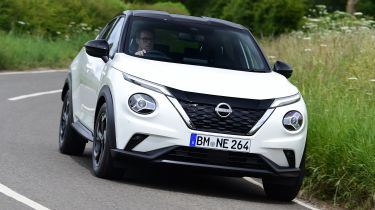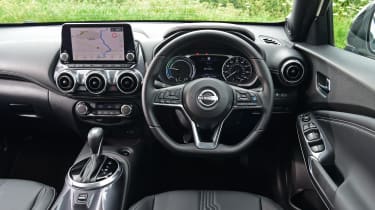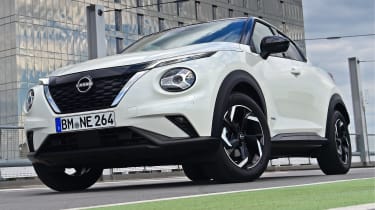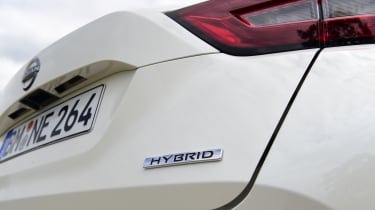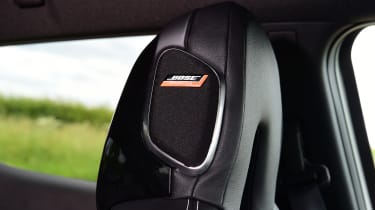New Nissan Juke Hybrid 2022 review
Nissan electrifies the Juke with hybrid power, making it the most appealing model in the line-up

Verdict
The Juke is far from the best small SUV on sale, but adding full hybrid power to the line-up has made it a more appealing if also more pricey car. However, buy on finance and it looks better value. It’s a shame, then, that the onboard tech is still behind the curve and the Juke Hybrid’s practicality can’t match its Alliance rival, the Renault Captur. But the ride and handling balance is fine and the new powertrain delivers impressive efficiency and stronger performance, so we’d say this is the best version of the car yet.
You could say that Nissan is something of an electrification pioneer, stealing a march on its rivals in Europe with its Leaf EV. However, when it comes to hybrids the brand has been a little sluggish to electrify its most popular models – but 2022 is the year that changes.
It’ll soon launch the Qashqai e-Power, but before that Nissan is rolling out its Juke Hybrid.
The headline stats are pricing from £27,250 (for the N-Connecta model – Visia and Acenta trims aren’t available in hybrid form), a 25 per cent increase in power over the pure-petrol Juke and a 20 per cent improvement in fuel consumption.
Used - available now
That means there’s a total of 141bhp on offer, split between a 93bhp 1.6-litre four-cylinder petrol engine and a 48bhp electric motor mounted inside a clever ‘multi-modal’ automatic gearbox that manages both power sources.
This powertrain is similar to that used by the Renault Captur E-Tech hybrid, but Nissan says while the belt starter-generator and transmission are shared with Renault, the petrol engine and e-motor – plus their calibration and tuning – are bespoke to the Juke. There’s also an e-Pedal function for increased regenerative braking and water cooling for the relatively compact 1.2 kWh battery; the Renault features neither of these elements.
Although the battery isn’t that big, the Juke always starts off in EV mode and can hit up to 34mph in pure-electric. Keep your inputs with the accelerator gentle and it’ll get up to speed smoothly without using a drop of fuel.
Ask for more acceleration and the petrol engine will support the electric motor, driving the wheels directly. It’ll also act as a generator to keep the battery topped up, meaning the e-motor keeps delivering its maximum 205Nm of torque.
The 0-62mph sprint takes 10.1 seconds, significantly quicker than a pure-petrol Juke, while claimed efficiency of up to 56.5mpg and CO2 emissions from 114g/km mean it’s more efficient too. We easily saw late 40s on our test route.
However, ask for that acceleration and the 1.6 unit’s relatively coarse engine note disrupts refinement; the Juke feels much happier at a relaxed pace, with the electric motor delivering the majority of performance and the combustion engine helping at lower revs.
While there’s been some fairly significant (but as yet undisclosed) revisions to the Juke Hybrid’s chassis, it’s still not a corner-carving compact SUV, so the approach that gets the best from the powertrain also feels best-suited to the chassis.
The steering is a good weight, and its speed is well judged for the amount of grip on offer and the suspension set-up; the Juke doesn’t feel like it rolls excessively and is surprisingly composed. But equally, it doesn’t feel all that dynamic. Sport mode doesn’t help this either.
The ride could be more forgiving too, as even on our Tekna model’s 17-inch wheels (up to 19-inch alloys are available) the Juke sometimes felt unsettled over larger bumps, although the car’s body control is good.
In town it’s acceptable, which is where the Juke feels at its best. You can force it to run in EV mode, while the car’s e-Pedal function also helps in built-up areas, as while the extra regeneration won’t bring the car to a halt, it does slow the Juke more effectively and tops the battery up, boosting efficiency.
Nissan claims that the Juke Hybrid can be driven with “one pedal for 99 per cent of the time”, and it doesn’t take long to adapt to the extra regeneration, anticipating traffic and modulating the throttle to make smooth progress.
The Juke Hybrid is distinguished by a series of cosmetic tweaks, including a new mesh for the grille and a gloss-black plastic strip that features on every electrified Nissan – as well as the brand’s new badging.
Hybrid badges on the front wings and the boot lid mean you can tell this Juke is electrified from every angle, while an active radiator grille shutter can close the intake if the car’s cooling requirements are low, helping reduce drag.
It’s joined by a reprofiled rear spoiler, while there are new aerodynamic components to smooth airflow around the front wheels, plus a rear-axle cover that reduces turbulence underneath the car.
Nissan has tweaked the Juke Hybrid’s interior too, with a new dial set-up that shows the level of power being supplied. There’s also a seven-inch digital panel that will show the flow of energy as well as other vital data.
However, the car’s central eight-inch touchscreen infotainment set-up still comes up short compared with the best in this class – especially when it comes to the graphics and the interface – even if our high-spec £28,750 Tekna test car does come loaded with kit, including sat-nav, Android Auto and Apple CarPlay, Nissan Connect connected services and voice recognition. There’s also a new keyless go system for the Juke Hybrid and an improved Bose stereo with speakers in the front-seat headrests.
Alongside the infotainment, other problems from the petrol Juke remain, including the compact rear seats, while packaging the battery means there’s even less boot space, at 354 litres compared with the regular car’s 422-litre offering.
However, while the Hybrid costs £1,730 more than a 1.0-litre DIG-T DCT automatic Juke spec-for-spec, according to Nissan’s figures it’s only £12 per month pricier on PCP (for an N-Connecta) – and the firm will also throw in a £750 deposit contribution, so given the extra efficiency and lower running costs it brings, it’s a strong value proposition within the range.
| Price: | £28,570 |
| Engine: |
1.6-litre 4cyl petrol hybrid |
| Power/torque: | 141bhp/N/A |
| Transmission: |
Multi-model automatic, front-wheel drive |
| 0-62mph: | 10.1 seconds |
| Top speed: | TBC |
| Economy/CO2: |
56.5mpg/114g/km |
| On sale: | Now |
Now read about our drive in a protoype of Nissan's all-electric SUV, the Ariya...

